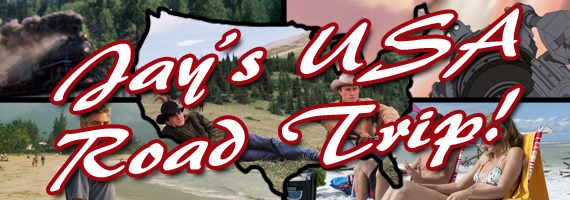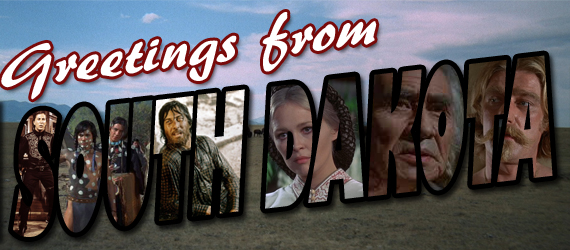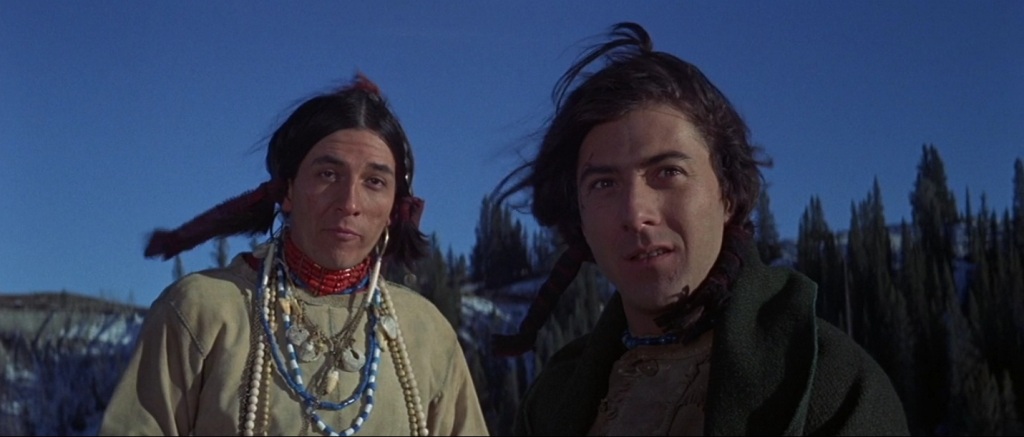
I’ve always wanted to travel across America. I’ve been a few times, to the major tourist attractions – Disneyworld in Florida, Vegas in Nevada, Cheers in Boston – but there’s so many places I’ve never seen in person, and most likely never will. Fortunately, there’s a solution, and it’s my own personal remedy to all life’s problems: movies. There’s been a movie set literally everywhere. Everywhere! So, this feature sees me cinematically visit a new state every week, through a film that was set there. You can read my journey so far here. Next up: South Dakota!
In a retirement home, a 121-year old man – claiming to be the only white survivor of the battle of Little Big Horn – is being interviewed about the habits of the Native Americans. Instead he recounts his life story, starting when he was ten years old and, after his family’s wagon trail was attacked, when he and his older sister were taken in by a tribe calling themselves the Human Beings. We see the boy – originally called Jack Crabb until the tribe renames him Little Big Man – undertake many adventures, becoming embroiled with the likes of a devout Christian couple, a snake oil salesman, Wild Bill Hickok and General Custer along the way.
When selecting a film for South Dakota, I ran into a spot of bother. You see, not a great many films are set there (except for when characters are looking at Mount Rushmore – Team America: World Police was very tempting), and the most prominent one I found is Terrence Malick’s Badlands, which I’m not terribly fond of and didn’t intend to watch again. However, I stumbled across Little Big Man which, according to Wikipedia, is at least partially set there, so it’ll do. The fact that it’s also on my precious 1001 Movies You Must See Before You Die list, and is a DVD I’ve had untouched for a few years now may have helped sway my decision, but it turns out that not a great deal of this film is set within that one particular state, but some of it is, so it’ll have to count I’m afraid.
This is an odd film to get my head around. I do enjoy epic movies – this one covers a stretch of around 30 years or so in Crabb’s life – however it has a wildly uneven tone and is very episodic. We’re guided throughout by Hoffman’s old-man-voice creaking door narration, complete with chapter closings akin to “And so it was I entered my gun-fighting period” to mark the end or beginning of that segment. That’s not necessarily a bad thing – this was adapted from the novel by Thomas Berger, so a chapter-based structure is almost expected – but these clear breaks in the narrative did interrupt the flow of the story. Also, there was a great deal more comedy than I was expecting, and in fact on IMDb this is initially listed as a comedy, which outside of parody efforts like Blazing Saddles or A Million Ways To Die in the West you don’t often see amongst the Western genre. The comedy is actually very effective and is often rather dark – Jack’s sister Caroline (Carole Androsky) is mortified that none of the tribesmen consider her worthy of even raping on their first night in the camp so she runs away – but too often it is paired adjacently with scenes of hardship or slaughter.
Hoffman is terrific in the title role. It’s nothing he hasn’t done better before or since, from his emotional moments with the tribal chief Old Lodge Skins (Chief Dan George) to his laughable squint-eyed gun-slinging routine, but it’s still worthy of note within his career, despite being overlooked for an Oscar nomination (although George received a Supporting nod, but was beaten by John Mills for Ryan’s Daughter). Faye Dunaway’s small but integral role as the Christian wife who takes Jack in is also good, and leads to probably one of the most confusing moments in his life, when his devout, adoptive mother bathes him, telling him to be wary of sinning and temptations, whilst she clearly is barely restraining herself from taking him there and then in the tub. I wanted more of Martin Balsam’s increasingly disabled salesman too, but alas the plot didn’t allow for it.
The overall film is very much a revisionist historical piece, especially with regards to General Custer (Richard Mulligan), whom here is depicted as an arrogant, stubborn fool, who is often wrong but refuses to change his mind in hindsight. On the other hand, the Human Beings tribe are shown as relatively friendly (although their marital statuses are somewhat questionable, when Crabb takes a wife who insists that he also marry and sire children with her three sisters, all in the same night). I suppose in a sense that makes this worth watching, to garner a different opinion on America’s history. However, it’s clear that a lot of the story has been made up by the character telling it. For instance, Crabb is a crack shot with a pistol before he’s even touched a gun, and learns by imagining he’s hit the target before he’s even drawn. I’m pretty sure that’s not how it works.
So, is this film worthy of your time? If you like westerns, and would like to see a slightly different take on one, then sure. It’s a little like Forrest Gump in the way the main characters crosses paths with famous people and events, with some ridiculous coincidences – Jack continually runs into the same small set of people over and over again, seemingly entirely by chance – but it lacks that film’s charm and stellar effects work – here blood has a distinctly vibrant, paint-like hue. I’m glad I’ve seen it, but I highly doubt I’ll ever watch it again.




